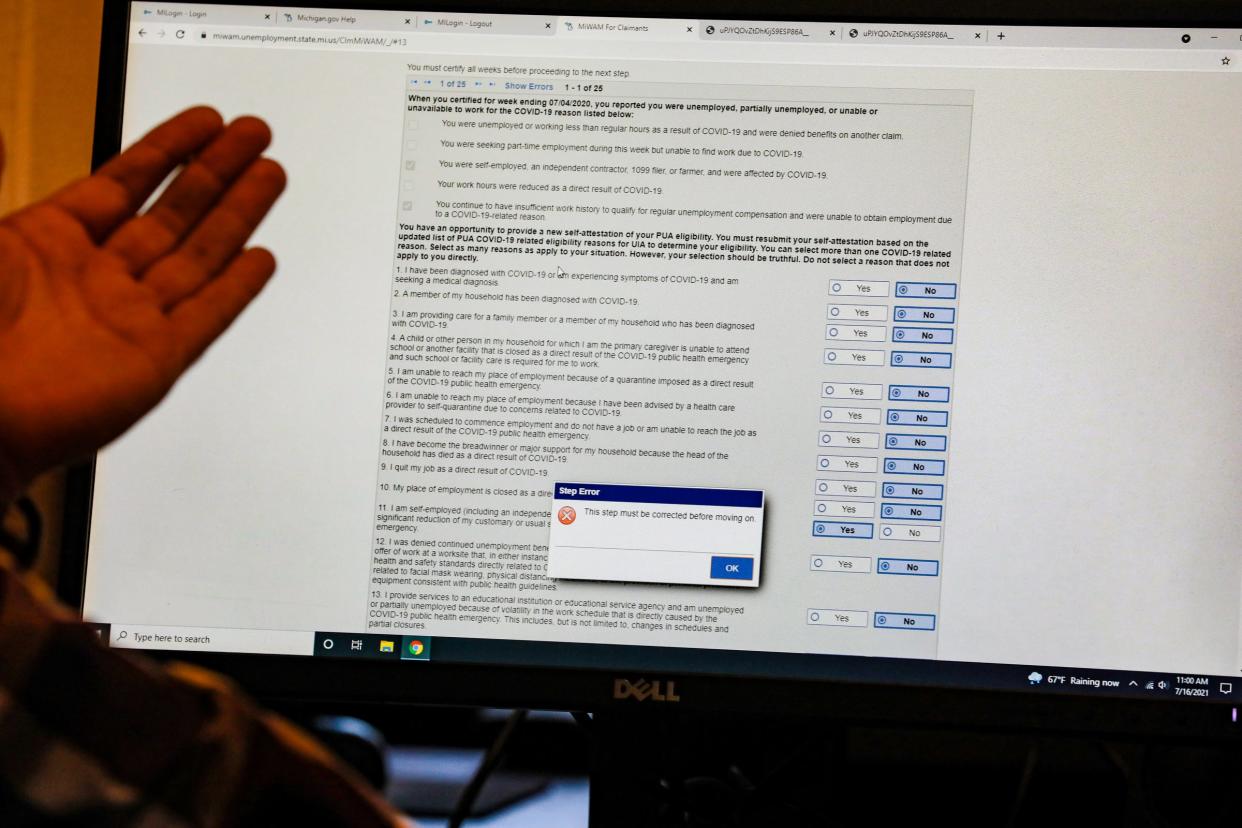Michigan's unemployment agency settles lawsuit for $55 million, will make changes
Michigan's Unemployment Insurance Agency will pay $55 million and make changes to how it processes claims as part of a settlement reached in a lawsuit from several pandemic-era unemployment insurance claimants who were told they owed money back to the state and in certain cases, had their wages garnished or tax returns seized.
The settlement, which was given preliminary approval late last week, will set aside $55 million for claimants who received unemployment benefits in the pandemic, had the benefits taken away by the state and have not had the money returned yet. The settlement also ensures that workers who applied for benefits in the pandemic — and anyone who applies for jobless benefits moving forward — will receive appropriate consideration under the law before collections resume.
"The settlement agreement provides for groundbreaking and unprecedented reforms and other nonmonetary relief," David Blanchard, an attorney with the Ann Arbor law firm Blanchard & Walker who represented the claimants, said in an email describing the settlement.

"This settlement agreement lets us focus staff and resources on customer service and reforms we are making at the Unemployment Insurance Agency that benefit Michigan workers and employers alike," Julia Dale, director of Michigan's UIA, said in an emailed statement. "Throughout this legal process, the UIA worked cooperatively with the court to establish new rules and procedures so Michigan residents won’t find themselves in a similar situation in the future."
The claimants, who filed the lawsuit in the Michigan Court of Claims in January 2022, argued that their due process rights had been violated after they received benefits in the pandemic and then were told they were overpaid benefits and had to pay them back. Collection activities were paused in December 2022 as part of a court order for any claimant with an overpayment letter who appealed or protested the decision.
Many of these claimants received federal money through the Pandemic Unemployment Assistance program, which was created during COVID-19 to extend benefits to workers not typically covered by traditional unemployment insurance, such as to freelancers, contract workers and self-employed workers. As Michigan's UIA and other states were experiencing a historic influx of claims, state agencies also were setting up three additional federal unemployment insurance benefits systems, including PUA.
As many as 1.83 million claimants were approved for some form of unemployment insurance benefits and received them but were later told they weren't eligible amid evolving guidance on eligibility from the federal government. The UIA said those claimants had to pay the money back and in some cases, the agency clawed back money from those claimants.
More on workers waiting on benefits: Years post-pandemic, some out-of-work Michiganders are waiting on unemployment benefits
The court order halting collections prevented the agency from going after more than $4 billion from claimants.
Since then, the UIA has returned more than $45 million in funds clawed back or applied those funds to other government debt a claimant may have owed. The agency has also voided hundreds of thousands of overpayment notices.
The additional $55 million will compensate class members whose money has not yet been returned or those who suffered hardship as a result of the collection. It also pays attorney fees.
The settlement, announced last Thursday, also establishes a $1.65 million fund for legal aid and nonprofit service providers who provide legal representation to unemployment insurance claimants.
Before collection resumes, the settlement stipulates that claimants who filed for benefits during the pandemic will receive appropriate consideration under the law and will be notified.
Specifically, the agency will void all denials of late protest and appeal filings based on a lack of "good cause," that were caused by the disruptions in service due to the historic influx of claims during the pandemic. The UIA will also retroactively fix the law that improperly barred part-time workers from receiving PUA benefits based on inability to consider full-time work.
Claimants and class members will be issued a new notice of their rights to request a waiver of overpayment before any collection activity occurs.
Going forward, the UIA will not: reconsider any previous finding of benefit entitlement more than 30 days after the first monetary determination is made or within one year with good cause; is prohibited from retroactively reversing and collecting previously paid benefits except in specific circumstances, and if it's decided that a claimant has to repay an overpayment, basic notice procedures must be followed.
"The Saunders settlement agreement is an important step for the agency acknowledging and remedying a decade of harm caused by a defective computer system," Blanchard said in the email. A new unemployment benefits system is set to be fully operational next year.
A final approval hearing is scheduled for March 2025.
Separately, Blanchard is representing several claimants who filed a lawsuit in federal court against Michigan's UIA in August 2022 because they had not received all the benefits they were entitled to in the pandemic, if at all.
The claimants argue that their due process rights were violated when benefits were frozen without notice or opportunity for a hearing.
Contact Adrienne Roberts: amroberts@freepress.com.
This article originally appeared on Detroit Free Press: Michigan UIA to pay $55 million in settlement over pandemic-era claims
